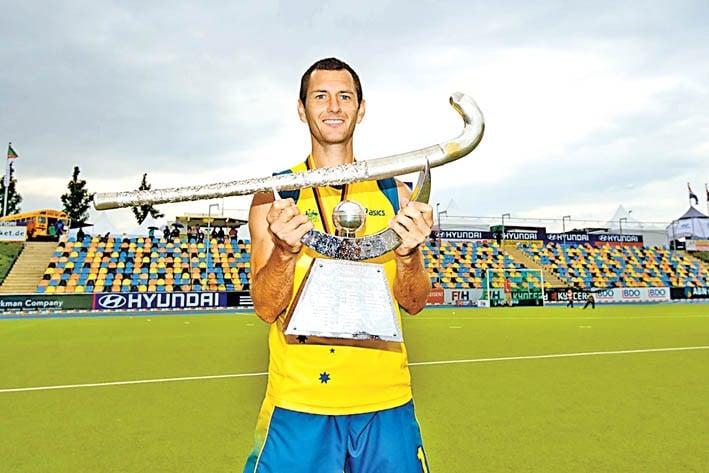
Australian talisman Jamie Dwyer is by far the best hockey player of his generation

In every era, every sport has a player and sometimes players who becomes the icon of that discipline.
Hockey has its own greats of different times. Pakistan ruled the hockey world for long periods, but that is now a distant memory. Names of Hasan Sardar during the better part of the ‘80s and immediately followed by Shahbaz Ahmed for almost a decade were synonymous with hockey across the world.
In 1998, the FIH instituted Player of the Year Award. Stephan Veen won the award twice. Another Dutch star Teun de Nooijer clinched it thrice. But one name stands out. The Aussie great Jamie Dwyer has won it no less than five times, including thrice in a row from 2009 to 2011. He first got the honour in 2004; had been named the ‘Young Player of the Year’ in 2002.
Remarkably, now 37, he is still going strong in the international arena. Dwyer was in his element at the recent Sultan Azlan Shah Cup won in style by Australia for the ninth time. He was not only his team’s joint top scorer with four goals but also made a number of assists and initiated so many attacks apart from helping the defence. He has always been a complete package.
In the tie against Pakistan, he produced the two most outstanding acts. As Australia took a free hit outside the Pakistani circle, their forwards were apparently well marked by the defenders. The Aussie hit seemed to be going nowhere when all of a sudden Dwyer ghosted to flick it into the goal and leave everyone dumbfounded.
Later, one ball was seemingly going to cross over the Pakistani goal line. Again Dwyer appeared from nowhere and from a very difficult position sent an inch perfect cut back to a lunging teammate who tapped it into the net.
Of a slight build and a little height, nicknamed Foetus by the Australian team-mates, Dwyer played a number of sports early on. He excelled in both cricket and hockey. When only 15, he had to make a decision as he had been offered a cricket scholarship. Cricket was his love but the desire to be an Olympian proved decisive. The speed and energy involved in hockey also attracted him.
His precocious talent was spotted early by the national selectors and Dwyer played for the national under-18 and under-21 sides before making his senior nation debut in 2001.
It has been a remarkable success story since then: individual as well as the team.
Dwyer’s first global title event was the 2002 World Cup (silver medal). The very next appearance earned him a place in the pantheon of the Australian Olympic heroes. At the 2004 Olympics, he was the man who scored the match- winning goal in the extra time of the final which secured Australian hockey’s first Olympic gold. They had to wait for 48 years. Two bronze were added in the next two Olympics, 2006 & 2010, where he also captained Australia.
And Kookaburras, as the Australian team is known, are the favourites for the gold at the coming Rio Olympics.
The World Cup medal cabinet is even more impressive. After being a member of the runner-up teams at the 2002 and 2006 (player of tournament as well) editions, his team moved further up. They were the World Champions in 2010, when Dwyer was the captain, and 2014.
He has a perfect record at the Commonwealth Games: three gold medals in as many appearances.
Perhaps the most decorated male hockey player in the history of the game, Dwyer’s international goal tally so far is an amazing 234 in 351 games.
The unbelievable talent of Dwyer has made him a target of clubs all over the world; he has played professionally in India, Spain, Germany and the Netherlands.
Hockey India League (HIL) has revolutionised the sport, making it a lucrative discipline. In its inaugural season in 2013, Dwyer was one of the only five marquee players among the 240 available for auction and was fetched by the Punjab Warriors for $78,000.
He has appeared in all the four editions of the HIL held so far. For the first three seasons, he remained with the Punjab Warriors and captained them to the runner-up position twice. He was popularly called Jamie Dwyer ‘Singh’ by the Punjab team’s fans.
In the Netherlands’ Hoofdklasse, the most competitive and well-organised league in the world, Dwyer plied his trade mostly for Bloemendaal, a leading Dutch club, for quite a few seasons.
In 2008-9, he made a vital contribution to Bloemendaal lifting the Euro Hockey League title which is hockey’s equivalent of the UEFA Champions League.
A year later, he also helped them win the Dutch national title. It was in the Netherlands where he met his future wife Leoni, a fellow hockey player.
Dwyer is as enterprising off the field as he is on it. That also mostly revolves around hockey. In 2008, Dwyer formed a company with fellow Mark Knowles called 1&9 Coaching (the name reflects his and Knowles’s jersey numbers) which offers coaching packages ranging from one hour to 5-week super camps to individuals, schools, colleges and clubs of all levels. Having played hockey for so many years he decided to venture into the business of actually designing his own brand of hockey sticks.
In 2010, he started his own hockey brand called JDH which is now being used by many international stars.
All this makes hockey Dwyer’s full time occupation.
In 2015, Daily Telegraph named top 10 greatest hockey players of all time. The list included six male and four female players. Jamie Dwyer’s name was very much there.